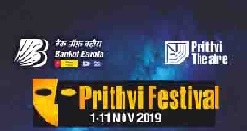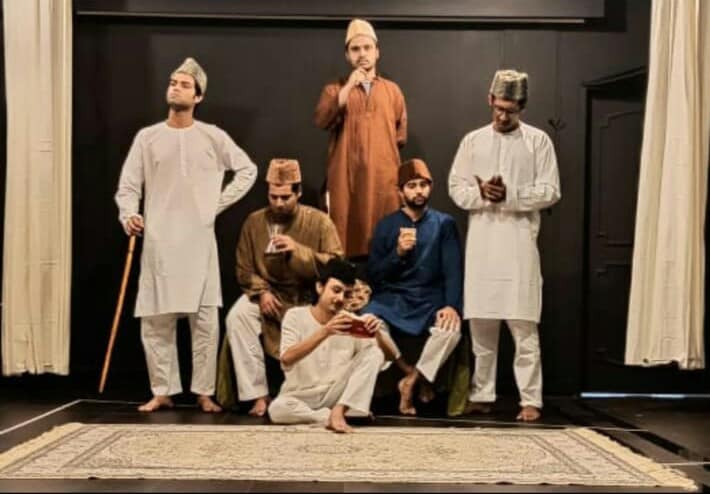|
|
||
|
Pro Tools
FILMFESTIVALS | 24/7 world wide coverageWelcome ! Enjoy the best of both worlds: Film & Festival News, exploring the best of the film festivals community. Launched in 1995, relentlessly connecting films to festivals, documenting and promoting festivals worldwide. Working on an upgrade soon. For collaboration, editorial contributions, or publicity, please send us an email here. User login |
Prithvi Festival 2019: Slippery Phislan and murderous Haye…Maar Dala Re
Prithvi Festival 2019: Slippery Phislan and murderous Haye…Maar Dala Re Started by the family of his youngest son, Shashi Kapoor, in memory of Papaji Prithviraj Kapoor, in 1978, Prithvi Theatre, built in the amphi-theatre style in upmarket Juhu, opened its doors to theatre groups and drama-lovers in 1978. First, its moving spirit was Jennifer Kendal, Shashi’s wife, and daughter of a theatre doyen, Geoffrey Kendal. When she had an untimely death, her daughter Sanjana took over the mantle, and the Prithvi Festival became an event that was eagerly awaited. Now that Shashi is no more and Sanjana lives in New Delhi, her brother Kunal has taken over supervising the annual 10-day event. Day five of the festival was day two for me, for I started attending shows only from November 4, Monday. And what a start it was on Tuesday: a full 100 minutes of Gagan Damama Bajyo; scintillating fare! Sadly, this play did not prepare me for what was to come in the shape of an under 70-minutes production called Phislan, meaning slipperyishness, if there can be such word. It was staged at Prithvi House, adjacent to the main venue, and termed a fringe event. They were being generous, I guess, for the right word would have been cringe event. And if it was to be staged, it should have been pushed to a location as far away from Prithvi Theatre as possible, not to the next building. Afsana Theatre's production describes itself as a “relationship between a newly assigned servant and his teenage master. Based in the era of Nawabs, where there were no girls around in school or colleges, and how the young lads used to explore the world of Lust. Story depicts the rawness of teenagers and their unexplored sexuality. Darkly comical and interestingly thrilling. Will the Lust turn into love? Or, will it have some consequences?” Never mind that the synopsis is badly written. Whatever is written is not what the play is about. In fact, I am still trying to figure out what the play was about.
Phislan suggests that in the era of Nawabs (minor kings/major landlords in British India), since co-education was not practiced, all the boys and men played games with sexual overtones and undertones, and even let their servants masturbate them. Are girls and women only to be found in schools or colleges? Do those who do not attend co-education schools turn to homo-sexuality or, for that matter, lesbianism? None of the actors has a defined character or indicative age. Scenes begin and end abruptly. Being a première show, one gets the distinct impression that the play was terribly under-rehearsed. I would be surprised if the original text of the play, written by one Muhammad Hassan Askari, was intended to be a play at all. More likely, it must have been a novel or novella, an afsana, chapters from which have been collated haphazardly, to constitute a play. Search Youtube and you will discover, “A story on the theme of homo-sexuality or paedophilia, 'Phislan', written by Famous critic and fiction writer, Muhammad Hassan Askari, is now uploaded on Adbi Duniya (Literary World)'s Youtube channel, in the voice of Taleef Haidar.” Most conversation and movements are unrealistic and repetitive. You can see that the performers are trying, but they are getting nowhere. A distinct Kashmiri feel is given by the music score, with the abundant use of the sarod and perhaps other instruments of the sarod family, though the exact setting is never indicated by name or inference. A popular film tune from the early 1980s is played several times, though the Nawab era ended at least 30 years earlier. Designated as meant for Adults Only, it should also have been mentioned that the intended audience should have low IQ. There is no taboo attached to homosexuality being depicted on stage, but not in the ludicrous and crude manner that Phislan does. Once it slips, it keeps slipping. Director: Jitendra Singh and a cast consisting of Ankit Saral, Asif Husain, Shanky, Kaustubh, Satish Sawant, Ansh Gupta, Viiay Jangid and Atmadeep Ray need to go back to the drawing board and either re-work this play in its entirety, or say goodbye to slippery territory. Rating: * ½ On any given day, there are usually two fringe performances at the same venue, one at 5 pm and another at 8. Both are usually 60-80 minutes in length. So, if you want to arrive early and get a good seat (first come first served), and want to see both performances, you would find yourself reaching the venue at 4.30 pm, coming out at 5.10 pm, killing time till 7.30 pm and then emerging from the first floor mini auditorium at 9.15 pm. That makes it about 280 minutes invested to watch 140 minutes of drama. Of course, your travel time, to and fro, is not included. Naturally, it is the die-hard theatre-buff who takes this ratio on. Now, if you also happen to be a movie critic and have had to see a film from 12 noon to 2.15 pm before having your lunch and heading for Prithvi, you can only call it an occupational hazard. After Phislan, I almost slipped back home, but I am glad I waited to see Haye…Maar Dala Re. A Back Benchers’ production, this ne too was marked for adults only, was of approximately 70 minutes duration, and like Phislan, had no interval. It was written and directed by Chitransh and the performers were Reet Kaur, Anjali Gaharana, Priyanka Kotwal, Bharat Bansi Malhotra, Errol Rodrigues, Amit Singh and Chitransh himself. Now, let us see what their summary of the play reads like: “Once upon a time a boy and a girl fell in love, their story started like an ordinary love stories but ends with an extraordinary ending.” Badly written again. But not misleading. Yes, indeed, a boy and a girl do fall in love. Their love story starts like many ordinary (read filmy) love stories, but has an extra-ordinary ending. Extra-ordinary is not the right word. Unexpected. With a shocking twist. That would be more like it. Getting creative about props, Chitransh uses real bicycles, parked on stands, to depict mock riding. In many films, including the legendary Chalti Ka Naam Gadi, the hero is a motor garage mechanic. Here, the love blossoms at a cycle puncture shop. The boy has a nagging mother, the girl has an overbearing father. Her best friend reads lust tales and helps the affair get on, he has a friend who is in a relationship but will sacrifice anything for his friend. Neither the boy nor the girl has any sympathy-winning traits. In fact, the boy is a lout, a lazy bum and a thief, no less. Neither parent is in favour of an alliance, but nothing will stop the lovers. As playwright, Chitransh plays with words and idioms with ease. Banter gives way to wit and repartee, which is very staccato and very funny. That is also a de-merit, for it all seems so pre-conceived. Also the cycle puncture repairer gradually slides into caricature. Intentionally? There is little doubt that the end will leave you numbed for a few moments, as the black comedy rapidly changes from comedy to black. Without any spoilers, let me tell you to keep looking out for a suit-case. In a couple of scenes, the actors seemed to forget dialogue and there seemed to be a jump, probably skipping an entire scene in the bargain. Casting was excellent, physicality matching the needs of the characters, and dialogue actually addressing the fact the boy was very tall while his mother was almost a dwarf. The sexual content was nothing an 18+ member of the audience would find uncomfortable facing. While the climax is not a situation one would advise a son or daughter to be part of, any son or any daughter anywhere in the world, to each his own. It was said that the play was inspired by a real incident. Chitransh has a lot of potential, both as writer and director. Disparate elements like mirth and murder come to him quite naturally, as a mixture, of right proportions. And the play is just about the right length. Over to Wednesday. Rating: *** 06.11.2019 | Siraj Syed's blog Cat. : Adbi Duniya Afsana Theatre Amit Singh Ankit Saral Ansh Gupta Asif Husain Atmadeep Ray Back Benchers Bharat Bansi Malhotra Chalti Ka Naam Gadi Damama Bajyo Errol Rodrigues Geoffrey Kendal Jennifer Kendal Jitendra Singh Kaustubh Kunal Muhammad Hassan Askari Nawabs Prithvi House Priyanka Kotwal Reet Kaur Satish Sawant Shanky Shashi Kapoor Taleef Haidar Viiay Jangid News PROS
|
LinksThe Bulletin Board > The Bulletin Board Blog Following News Interview with EFM (Berlin) Director
Interview with IFTA Chairman (AFM)
Interview with Cannes Marche du Film Director
Filmfestivals.com dailies live coverage from > Live from India
Useful links for the indies: > Big files transfer
+ SUBSCRIBE to the weekly Newsletter Deals+ Special offers and discounts from filmfestivals.com Selected fun offers
> Bonus Casino
User imagesAbout Siraj Syed Syed Siraj Syed Siraj (Siraj Associates) Siraj Syed is a film-critic since 1970 and a Former President of the Freelance Film Journalists' Combine of India.He is the India Correspondent of FilmFestivals.com and a member of FIPRESCI, the international Federation of Film Critics, Munich, GermanySiraj Syed has contributed over 1,015 articles on cinema, international film festivals, conventions, exhibitions, etc., most recently, at IFFI (Goa), MIFF (Mumbai), MFF/MAMI (Mumbai) and CommunicAsia (Singapore). He often edits film festival daily bulletins.He is also an actor and a dubbing artiste. Further, he has been teaching media, acting and dubbing at over 30 institutes in India and Singapore, since 1984.View my profile Send me a message The EditorUser contributions |





























